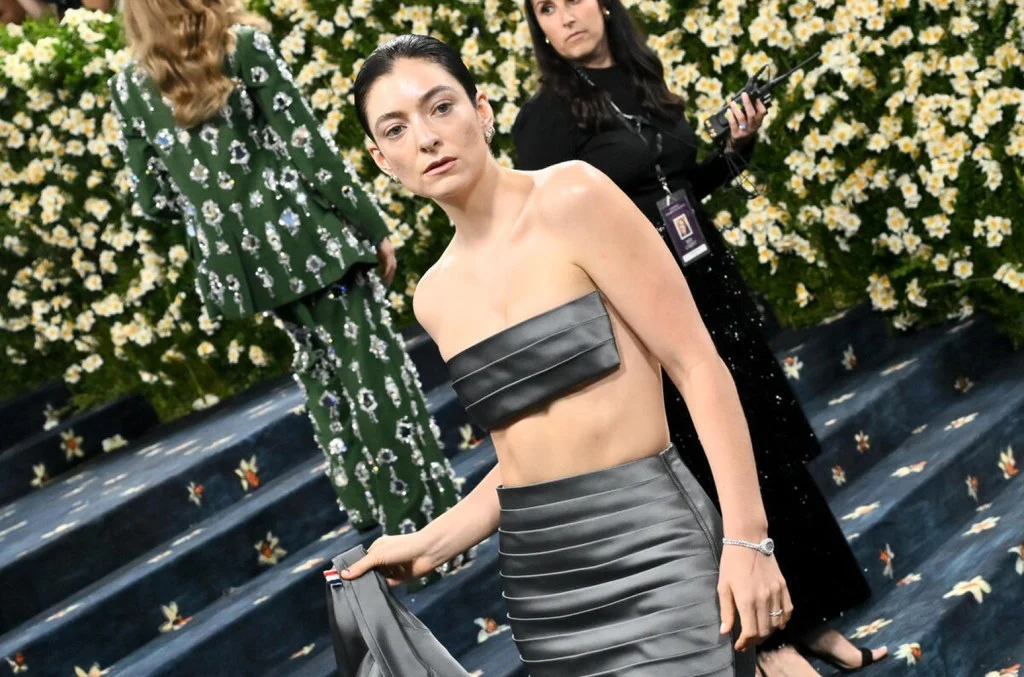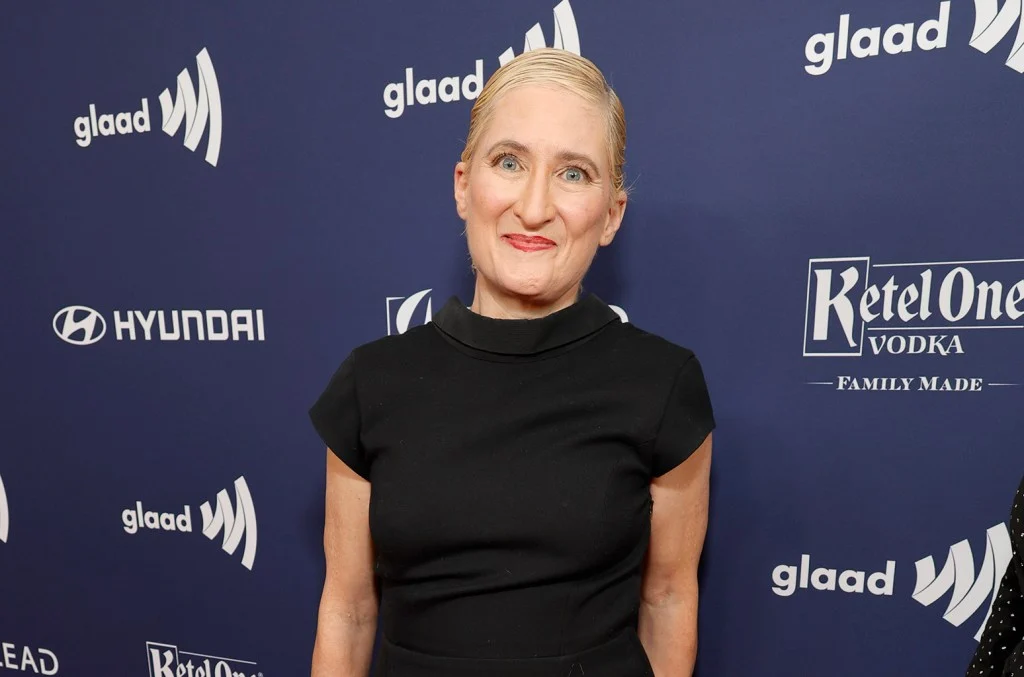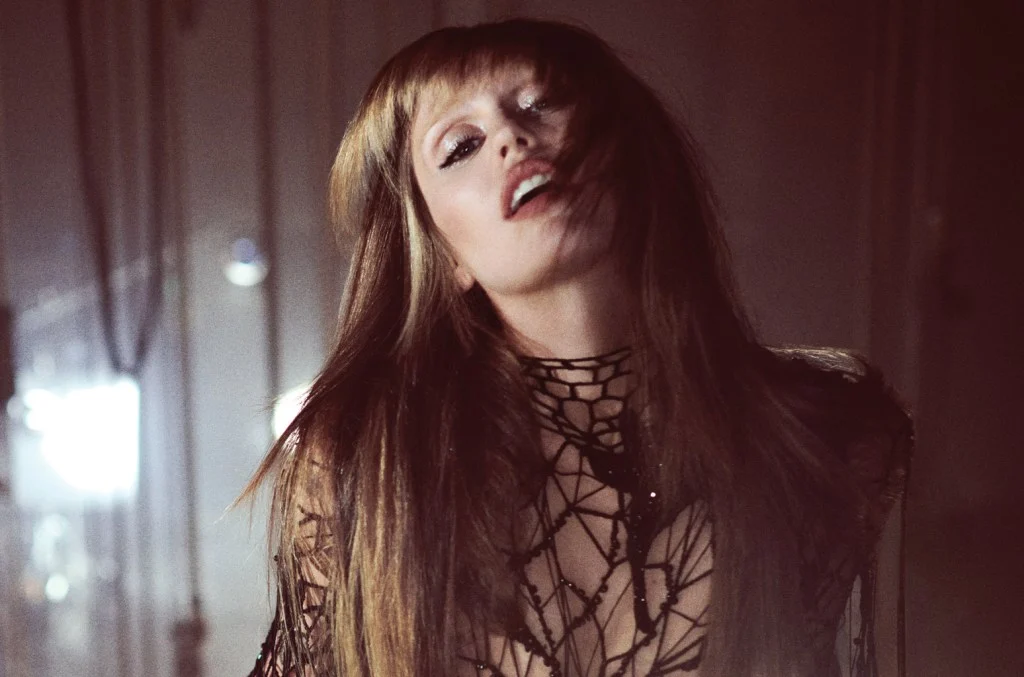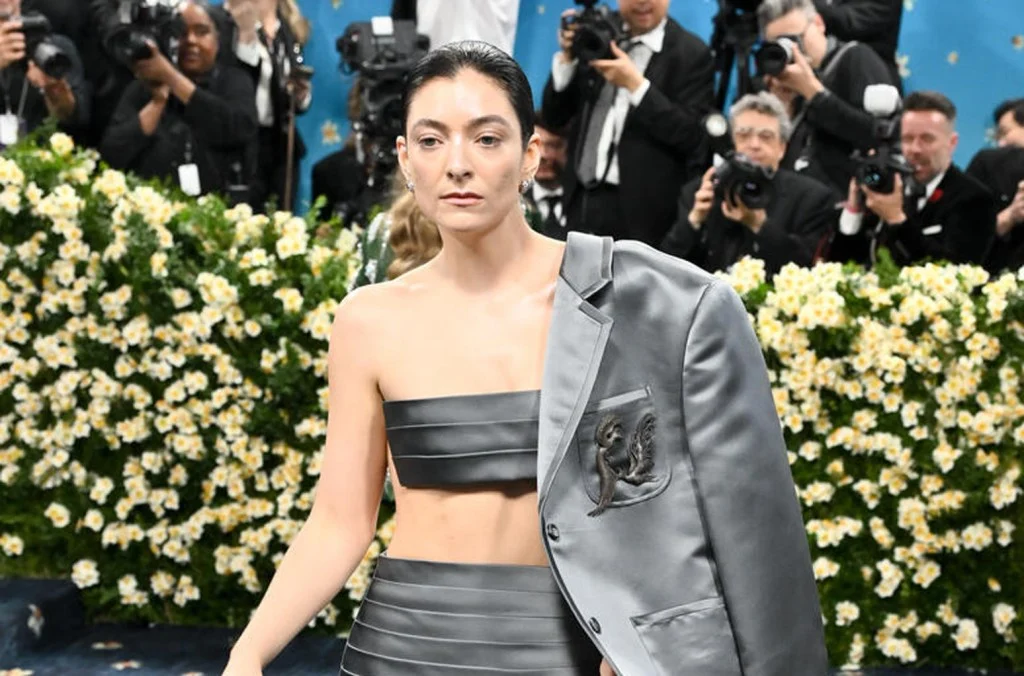Pride
Page: 5
Before you head off on your three day weekend, take a moment to add some new tracks to your playlista from your favorite queer artists. Billboard Pride is proud to present the latest edition of Queer Jams of the Week, our roundup of some of the best new music releases from LGBTQ+ artists.
Explore
Explore
See latest videos, charts and news
See latest videos, charts and news
From Renee Rapp’s cheeky return to St. Vincent’s Spanish-language reimagination, check out just a few of our favorite releases from this week below:
Reneé Rapp, “Leave Me Alone”
For every fan of Reneé Rapp’s that’s been asking, ad nauseum, “where’s the single,” the singer has a definitive answer — “leave me alone, b—h, I wanna have fun.” On this rollicking, tongue-in-cheek meta-commentary, Rapp gives her fans everything they could have asked for with her return. The lyrics are just as unhinged and provocative as the singer herself, the production adds some rock vibes to her established pop’n’b sound, and the vibes are simply, immaculate. We don’t predict anyone will be leaving
Trending on Billboard
St. Vincent & Mon Laferte, “Tiempos Violentos”
While St. Vincent has already shared a Spanish-language version of her standout track “Violent Times” from All Born Screaming, the singer-songwriter certainly hasn’t done so with rising singer-songwriter Mon Laferte. Now, “Tiempos Violentos” is given a new edge, as the pair trade lines in English and Spanish, while expanding the jazzy, dark track to a new, broader world of sound that fits both artists like a glove.
Cerrone & Christine and the Queens, “Catching Feelings”
It turns out when you take disco legend Cerrone and pace him with avant-pop chameleon Christine and the Queens, you get one of the most immediately enjoyable tracks of the year. On “Catching Feelings,” the pair lean into their strengths and create a guitar & drum-driven disco-pop track that will have you grooving along within moments.
Allison Goldfrapp, “Reverberotic”
Goldfrapp fans, wake up! We got a new banger from Allison herself! “Reverberotic,” the latest off the singer’s forthcoming new album Flux, sees Goldfrapp embracing synth-pop, trance and a touch of soul to make for one of her most unique-sounding tracks to date. “Reverberotic, wanna feel that again/ Vibrating light, a supernatural ascent,” she croons on the undulating chorus. “Reverberotic, all your dreams in the cloud/ Your sweet elixir is a part of me now.”
PINKNOISE, “Bittersweet”
It’s been a good week for rising heavy metal rocker PINKNOISE. Not only did the fast-rising artist (known off-stage as Kacey Foxx) sign with Nettwerk Music Group, but they decided to celebrate that fact with a new track. On “Bittersweet,” Foxx delivers the full range of their artistry, starting the song from a cool, quiet space before blowing up the premise and delivering a hard rock ballad that feels like it’s being powered by jet fuel. If you haven’t listened to PINKNOISE before today, let this be your official notice to go press play now.
Check out all of our picks below on Billboard’s Queer Jams of the Week playlist:
When Shamir first broke into music in 2015, the artist made a deal with himself: “Once I feel like I’ve done and said everything that I felt like I wanted to do and say, then I will call it,” he recalls. “I didn’t want to be an artist who was doing this just because it’s their job.”
Explore
Explore
See latest videos, charts and news
See latest videos, charts and news
One decade and 10 studio albums later, Shamir is making good on that promise. Ten, the mercurial multi-hyphenate’s excellent, indie rock-infused new album (out now via Kill Rock Stars) is his last one, too. Over the course of 10 songs, Shamir tackles big and small questions — the existential struggle with aging on album-closer “29” feels right at home with the simpler understanding of love lost on “I Know We Can’t Be Friends” — before closing out this chapter of his professional life.
As he tells it, the decision to walk away from music was easy, at least in part because he had already experienced the closest thing he’s had to a break between his projects. Since putting out Ratchet in 2015, Shamir has released new albums at almost a yearly pace, occasionally dropping two full LPs in a single calendar year. But after the release of his 2023 project Homo Anxietatem, the singer says he found himself in need of some time off.
Trending on Billboard
“I was producing with a friend, and we were just, like, throwing the ideas around. And all of a sudden I realized I didn’t have any plans to make an album. I didn’t even really have, like, songs or anything,” he says. “But I was like, ‘I want to work with you just because we’re friends.’ That didn’t end up working out with that person, but the idea of working with friends really stuck with me.”
It was a different mode of operation for Shamir. Since getting dropped by XL Recordings over creative differences shortly after the release of Ratchet, he’s largely self-written and self-released his own projects, occasionally teaming up with other indie labels to help bring his LPs to life.
That changed when the artist found a new home at Kill Rock Stars. Since signing with the label in 2023, prior to the release of Homo Anxietatem, Shamir says he no longer felt burdened by the expectations of doing everything himself. “To have that space and have that backing from the label gave me a little bit more clarity,” he explains. “Ending this chapter of my career felt like it came from a place of peace instead of frustration, which I love.”
Where other artists might use a final album to say all the things they’ve ever wanted to say in their music, Shamir didn’t have to do the same — he’d already shared his deepest thoughts through albums like Heterosexuality and Hope. Instead, he decided to draw his conclusions about working with friends to their eventual conclusion.
Every song on Ten, for the first time in Shamir’s career, are entirely written and produced by others. Whether he was asking his closests friends to let him sing a song they wrote or combing through those same friends’ unreleased demos to find songs he could perform, Shamir ended up with 10 tracks, written by and for others, now being interpreted through his own distinct artistic lens.
“I have so many incredible friends who aren’t necessarily songwriters by trade, yet are just incredible songwriters,” he explains. “I didn’t want them to write ‘a Shamir song,’ you know what I mean? I wanted demos and vault tracks tracks, and to metabolize those and bring them into my world and make them my own.”
A key example of the selection process, Shamir says, is the album’s opening track “I Love My Friends.” Back in 2021, Shamir received an email from his close friend Andrew Harmon, with the song’s title as a subject line and nothing but an MP3 in the body. Enclosed was the song, written by Harmon exclusively as a dedicated thank you to his close-knit circle for helping him deal with the death of his father.
“I remember listening to it, and by the end I was just in tears,” Shamir says of the song. “A dedication like that, unprompted and as a thank you — as opposed to just sending a thank you card or something like that — was just so beautiful to me.”
Another standout from the album, the heartbreaking “I Don’t Know What You Want From Me,” was written by Torres, who Shamir “wasn’t even particularly close with.” But when he presented them with the idea backstage at a music festival, they immediately said they wanted to send him a track. “[Torres] was literally on tour, and still sent me three demos,” he says. “That one was definitely the most shocking, just in terms of their enthusiasm for the idea.”
It’s for that reason that Ten plays out as a love letter rather than a farewell, where Shamir thanks the people who buoyed him in a turbulent career for a decade. It’s also why Shamir decided to release the album on May 19 — the one year anniversary of his debut album Ratchet.
“It was just like an extra kind kismet thing that I was able to add on to the triple entendre of it all,” he says. “It’s so rare when that happens, so when it does happen, it just feels so much like confirmation.”
As it turns out, having said everything he wanted to say in his career is just one of the reasons Shamir made the decision to call it quits after Ten. Part of the reason he relied so much on the support of his friends was simply because the music industry is a hard place to thrive, especially as a Black queer artist wanting to do something different.
Shamir qualifies that with the simple fact that “we made a lot of strides with queer people in pop music.” But after a certain point, the singer saw a pattern emerge, and it was one that he had no interest in adding to. “As a Black queer person, it’s not only hard to assimilate, but we are rewarded when we assimilate. We have to play the game to for survival,” he says. “In a lot of ways, I have suffered because I refuse to assimilate — but it was worth it for me.”
Sure, there are drawbacks that came with that: “I was not able to reach a certain level of mainstream success,” Shamir relents. But broad recognition isn’t the metric by which he chooses to measure himself. “Whenever anyone looks back on my career in five, 10, 15, 20 years from now, they’re going to be like, ‘Oh, but he never compromised,’” he says. “And I never will.”
Pride Month is only two weeks away, so now’s the best time to start packing your playlists with queer bangers. Billboard Pride is proud to present the latest edition of Queer Jams of the Week, our roundup of some of the best new music releases from LGBTQ+ artists.
Explore
See latest videos, charts and news
See latest videos, charts and news
From Kesha’s latest banger to Arca’s glitchy new track, check out just a few of our favorite releases from this week below:
Kesha, “BOY CRAZY.”
While fans have been thrilled to see Kesha looking back on her early-2010s stylings with her new songs, the pop star decided to turn her eyes to the future for her latest offering. Sure, “BOY CRAZY” takes a few of its cues from glittering 80s synth-pop, but the majority of the track plays like a revved up hyperpop anthem, as Kesha whets her appetite for the male form in this thrilling new track.
Trending on Billboard
Arca, “Puta”
Throughout her career, Arca has prided herself on zigging where people thought she might zag. With her double single release, Arca gives fans a song they can dance to with “Puta” — but it’s her second song “Sola” that shines brightest here. Over a scintillating beat and with a vocoder-assisted vocal, Arca lets herself strip some of the artifice away to show her own vulnerability. “I don’t want any more damage in love,” she sings in Spanish.
G Flip, “Disco Cowgirl”
What says “it’s summer” more than some ’80s synths and an anthemic vocal? Australian star G Flip is ready to ring in the season with “Disco Cowgirl,” their glittering new track dedicated to hot nights, messy relationships and good music. Along with providing some of the cleanest production of their career, “Disco Cowgirl” sounds like a vocal level up for G, as they deliver a full-blown belt of the song’s thesis in the final moments of the chorus: “Could’ve been my disco cowgirl/ But you rode off into the sunset without me.”
Frankie Grande, “Boys”
Turns out vocals run in the family! Frankie Grande debuted his latest single “Boys” on Friday (May 16), a club-ready pop track that sees the singer setting his sights on … well, you saw the title! Using his airy falsetto over a hard-hitting beat makes Grande’s new track an immediate contender for “That Song You Keep Hearing at Pride Festivals” in 2025.
Orla Gartland, Everybody Needs a Hero (Extended Edition)
Who doesn’t love a victory lap? After earning critical acclaim for her excellent 2024 album Everybody Needs a Hero, the Irish singer-songwriter is giving fans five bonus tracks on a new extended edition of the LP. Ranging from post-punk rage-outs (“Now What?”) or indie-rock kiss-offs (immediate standout “Pest” with Tommy Lefroy), the deluxe version of Hero gives Gartland’s fans just enough new mixed in with the vibe sound they’ve come to love.
Check out all of our picks on Billboard’s Queer Jams of the Week playlist below:

In the lead-up to her new album Virgin, Lorde has started to slowly open up about her broadening gender identity with the world. But before she was ready to do that, she confided in one of her new friends: Chappell Roan.
In a Rolling Stone cover story published Thursday (May 15), the New Zealand native revealed that she and the “Pink Pony Club” singer have gotten quite close over the past year, and that one of the things they’ve discussed is Lorde’s changing relationship with gender. When asked how she identifies now, the “Royals” artist told the publication, “[Chappell Roan] asked me this … She was like, ‘So, are you nonbinary now?’”
“I was like, ‘I’m a woman except for the days when I’m a man,’” Lorde continued. “I know that’s not a very satisfying answer, but there’s a part of me that is really resistant to boxing it up.”
Trending on Billboard
The musician also explained that she still identifies as a cisgender woman who uses “she” and “her” pronouns. But the complexities of her newfound gender fluidity informed much of the June-slated Virgin, the opening track of which Rolling Stone reveals finds her declaring, “Some days I’m a woman/ Some days I’m a man.”
Even so, Lorde added that she doesn’t think her gender expression is “radical” compared to what most transgender and nonbinary people face on a daily basis. In the United States in particular, the rights of LGBTQ people have been under constant threat for years, something Roan — a longtime advocate for the community and a queer-identifying artist herself — has spoken out about many times.
“I see these incredibly brave young people, and it’s complicated,” Lorde said. “Making the expression privately is one thing, but I want to make very clear that I’m not trying to take any space from anyone who has more on the line than me. Because I’m, comparatively, in a very safe place as a wealthy, cis, white woman.”
The star’s embrasure of her new gender expression is one of several personal transformations that has occurred since she last dropped an album, 2021’s Solar Power, four years ago. In addition to breaking up with Universal Music executive Justin Warren after about eight years together — “It was so painful, as they are, but there was real dignity to it,” she told the publication of the split — Lorde also recovered from an eating disorder, something she’s also been increasingly open about in the weeks ahead of Virgin‘s June 27 release.
“I felt so hungry and so weak,” she recalled of being obsessed with calories and protein intakes around the time Solar Power came out, specifically the day it dropped. “I was on TV [that] morning, and I didn’t eat because I wanted my tummy to be small in the dress. It was just this sucking of a life force or something.”
See Lorde on the cover of Rolling Stone below.
For her 34th birthday, RuPaul’s Drag Race star Valentina decided to give herself some peace of mind as a present, when she came out as a transgender woman in a new social media post. Explore Explore See latest videos, charts and news See latest videos, charts and news In a post to her Instagram on […]
In need of some new tunes from your favorite queer artists? We’ve got you covered — Billboard Pride is proud to present the latest edition of Queer Jams of the Week, our roundup of some of the best new music releases from LGBTQ+ artists.
Explore
See latest videos, charts and news
See latest videos, charts and news
From Miley Cyrus‘ emotional new song to Kali Uchis’ introspective new album, check out just a few of our favorite releases from this week below:
Miley Cyrus, “More to Lose”
With Something Beautiful’s first two offerings (the title track and “End of the World”), Miley Cyrus gave fans two unique looks into her forthcoming new project. “More to Lose” continues that trend, stripping back the art-rock and glam-pop artifice of the album’s other singles to deliver a lofi, stripped-back ballad examining the memory of a lost love. The pop singer’s smooth alto voice glides effortlessly over lush instrumentation as she bids farewell to a bygone relationship: “I knew someday that one would have to choose,” she sings. “I just thought we had more to lose.”
Halsey & Amy Lee (of Evanescence), “Hand That Feeds”
Having already collaborated with Nine Inch Nails’ Trent Reznor and Atticus Ross for 2021, Halsey’s ready to take another spin around the block with a goth legend. On “Hand That Feeds,” featuring Evanescence’s lead vocalist Amy Lee, Halsey expertly blends her own pop stylings with the alternative metal that made her collaborator a star in the early 2000s.
Kali Uchis, Sincerely,
Kali Uchis has never been satisfied with fitting into just one lane. Sincerely, the singer’s latest album, takes yet another bold step in a new direction for the Latin star, as she explores soul, pop and even doo-wop (with a stunning bit of Amy Winehouse-esque flair on album stand out “All I Can Say”). It certainly doesn’t hurt that the unifying factor for all of Uchis’ projects — her flawless voice — continues to shine on this dreamy new album.
Maren Morris, Dreamsicle
“I was always too good for your a– anyway,” Maren Morris belts on “Too Good,” one of the immediate standouts off her vibrant new LP Dreamsicle. It also serves as something of a tone reset for an album that refuses to take itself too seriously; all throughout Dreamsicle, Morris explores a world post-divorce, as she dives back into one night stands (“Bed No Breakfast”), occasional meltdowns (“Cry in the Car”) and leaving the things behind that don’t serve her (“Lemonade”). Leaning hard into her pop sound, Morris has never sounded like she’s having more fun than on the sticky sweet Dreamsicle.
Snow Wife, “Sweat”
Need something to strut down the street to? Allow Snow Wife to assist with “Sweat,” her thrilling new Y2K pop jam. Blending together the stylings of Britney Spears with The Pussycat Dolls, the up-and-coming pop singer bounces her way through this sultry new song as she commands her listeners to dance along — and after your first listen, we’d be shocked if you managed to resist the call.
Jake Wesley Rogers, In the Key of Love
There’s a reason why Jake Wesley Rogers was heralded as a generational talent by none other than Sir Elton John. Take just one listen to his debut album In the Key of Love and you’ll hear that familiar brand of confessional, deeply personal songwriting filtered through a pop lens so inherently catchy that you cannot help but hit the replay button. Rogers’ commitment to blending pop and gospel sounds together into a harmonious new sound is a statement enough in and of itself — one that you won’t be able to forget after you’ve heard the words he’s singing on identity, spirituality and finding comfort in who you are.
Check out all of our picks below on Billboard’s Queer Jams of the Week playlist:
It’s a question that’s long been asked by Smilers around the world: Which Miley Cyrus album is the gayest? According to the singer, there is an official answer. During Spotify’s An Evening With Miley Cyrus event in New York City on Tuesday (May 6), the “End of the World” singer posed herself a rhetorical question […]
When Maren Morris publicly came out as bisexual in June 2024, fans and fellow artists alike shared their messages of congratulations for the singer-songwriter. Nearly a year later, Morris says those affirmations had a more profound impact than one might think. In a new interview with The Zoe Report, Morris opened up about coming out, […]
Lorde attended her first Met Gala in four years Monday (May 5), but she wasn’t just there for fun. According to the pop star, she also used the event to tease something coming in the future, revealing that the look she wore on the red carpet is an “Easter egg” that also happens to express […]

Following Jill Sobule’s tragic death on Thursday, the president and CEO of GLAAD released a statement honoring the groundbreaking singer/songwriter. “Jill wasn’t just a trailblazer in music—she was a beacon for queer artists, and I was incredibly lucky to call her a dear friend,” Sarah Kate Ellis wrote on Friday morning (May 2). “Long before […]

 State Champ Radio
State Champ Radio 





